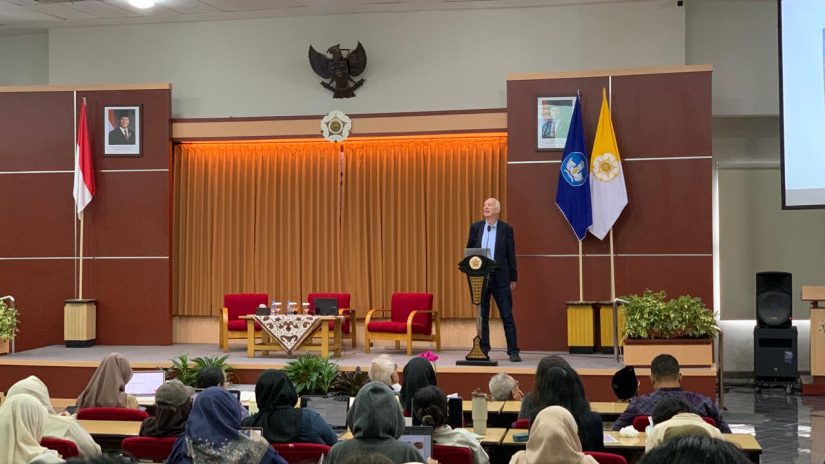
The culture of consumer that glorifies boundless luxury is now facing its most pressing test: sustainability. This was the central message delivered by Prof. Dr. Mike Featherstone, a distinguished sociologist from Goldsmiths, University of London, in a public lecture titled “Consumer Culture: Luxury and Sustainability” organized by the Graduate Program in Cultural and Media Studies (KBM) at Universitas Gadjah Mada (UGM) on Thursday, 6 November 2025. The event formed part of KBM’s 20th Lustrum celebration, marking two decades of fostering and cultivating critical thinking amidst rapid social and cultural transformations.
The lecture, which drew more than 200 participants, was held at the Auditorium, 5th Floor, Graduate School Building of UGM. The event began with opening remarks from Budiawan, Ph.D., Head of the Doctoral Program in Cultural and Media Studies, followed by Prof. Ir. Siti Malkhamah, M.Sc., Ph.D., Dean of the Graduate School, and was officially opened by Prof. Dr. Wening Udasmoro, S.S., M.Hum., DEA., Vice Rector for Education and Teaching at UGM.
In his lecture, Featherstone explored how luxury has evolved from a marker of aristocratic privilege into a mass lifestyle underpinning global capitalism. He highlighted how luxury now permeates every aspect of modern life, as a promise of freedom and self-realization, yet simultaneously deepens social inequality and exacerbates ecological crises. Citing Jean Baudrillard, Featherstone argued that modern humans live within an “aesthetic hallucination of reality,” a world where images and consumption have replaced reality itself.
He further noted that behind the glittering façade of consumer culture lies a stark concentration of wealth among a small elite, while the majority remain trapped in cycles of exhausting consumption. Drawing on Ulrich Beck and Bruno Latour, Featherstone underscored the need to abandon the illusion of an “infinite planet” and to relearn how to inhabit the Earth more consciously and responsibly.
Concluding his lecture, Featherstone invited the audience to view luxury not merely as material possession or lifestyle, but as an inner experience bound to memory, meaning, and sensitivity to the world. Referencing Walter Benjamin, he reflected on the value of overlooked everyday objects, such as tickets, food wrappers, small fragments of life, that can evoke memory, emotion, and intrinsic worth. True luxury, he suggested, resides in the ordinary, in the affective power of human experience.
He closed with a spiritual reflection rooted in the Franciscan motto “Nihil habentes, omnia possidentes”, having nothing, yet possessing everything. Quoting Georg Simmel, Featherstone revisited the tension between objective and subjective culture, affirming that genuine freedom belongs to those who are not possessed by possessions. In “having nothing,” he argued, one may attain immaterial luxury, such as a sense of happiness, gratitude, and the capacity to appreciate the beauty of the world.
Moderated by Dr. Suzie Handajani, M.A., lecturer at KBM and the Department of Anthropology, UGM, the session concluded with an engaging discussion between Featherstone and participants from diverse academic backgrounds. The Q&A reflected on how the rise of consumer culture can be read as a social phenomenon that demands critical and contextual understanding.
By hosting world-renowned thinkers such as Mike Featherstone, KBM UGM reaffirms its commitment to expanding intellectual horizons and sharpening critical sensitivity to contemporary global issues, from consumer culture and media to the urgent pursuit of sustainability.
Contributor: Febriany Dian Aritya Putri
